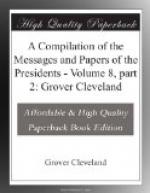My opinions will be frankly expressed upon the leading subjects of legislation; and if—which I do not anticipate—any act should pass the two Houses of Congress which should appear to me unconstitutional, or an encroachment on the just powers of other departments, or with provisions hastily adopted and likely to produce consequences injurious and unforeseen, I should not shrink from the duty of returning it to you, with my reasons, for your further consideration. Beyond the due performance of these constitutional obligations, both my respect for the Legislature and my sense of propriety will restrain me from any attempt to control or influence your proceedings. With you is the power, the honor, and the responsibility of the legislation of the country.
The Government of the United States is a limited Government. It is confined to the exercise of powers expressly granted and such others as may be necessary for carrying those powers into effect; and it is at all times an especial duty to guard against any infringement on the just rights of the States. Over the objects and subjects intrusted to Congress its legislative authority is supreme. But here that authority ceases, and every citizen who truly loves the Constitution and desires the continuance of its existence and its blessings will resolutely and firmly resist any interference in those domestic affairs which the Constitution has clearly and unequivocally left to the exclusive authority of the States. And every such citizen will also deprecate useless irritation among the several members of the Union and all reproach and crimination tending to alienate one portion of the country from another. The beauty of our system of government consists, and its safety and durability must consist, in avoiding mutual collisions and encroachments and in the regular separate action of all, while each is revolving in its own distinct orbit.
The Constitution has made it the duty of the President to take care that the laws be faithfully executed. In a government like ours, in which all laws are passed by a majority of the representatives of the people, and these representatives are chosen for such short periods that any injurious or obnoxious law can very soon be repealed, it would appear unlikely that any great numbers should be found ready to resist the execution of the laws. But it must be borne in mind that the country is extensive; that there may be local interests or prejudices rendering a law odious in one part which is not so in another, and that the thoughtless and inconsiderate, misled by their passions or their imaginations, may be induced madly to resist such laws as they disapprove. Such persons should recollect that without law there can be no real practical liberty; that when law is trampled under foot tyranny rules, whether it appears in the form of a military despotism or of popular violence. The law is the only sure protection of the weak and the only efficient




